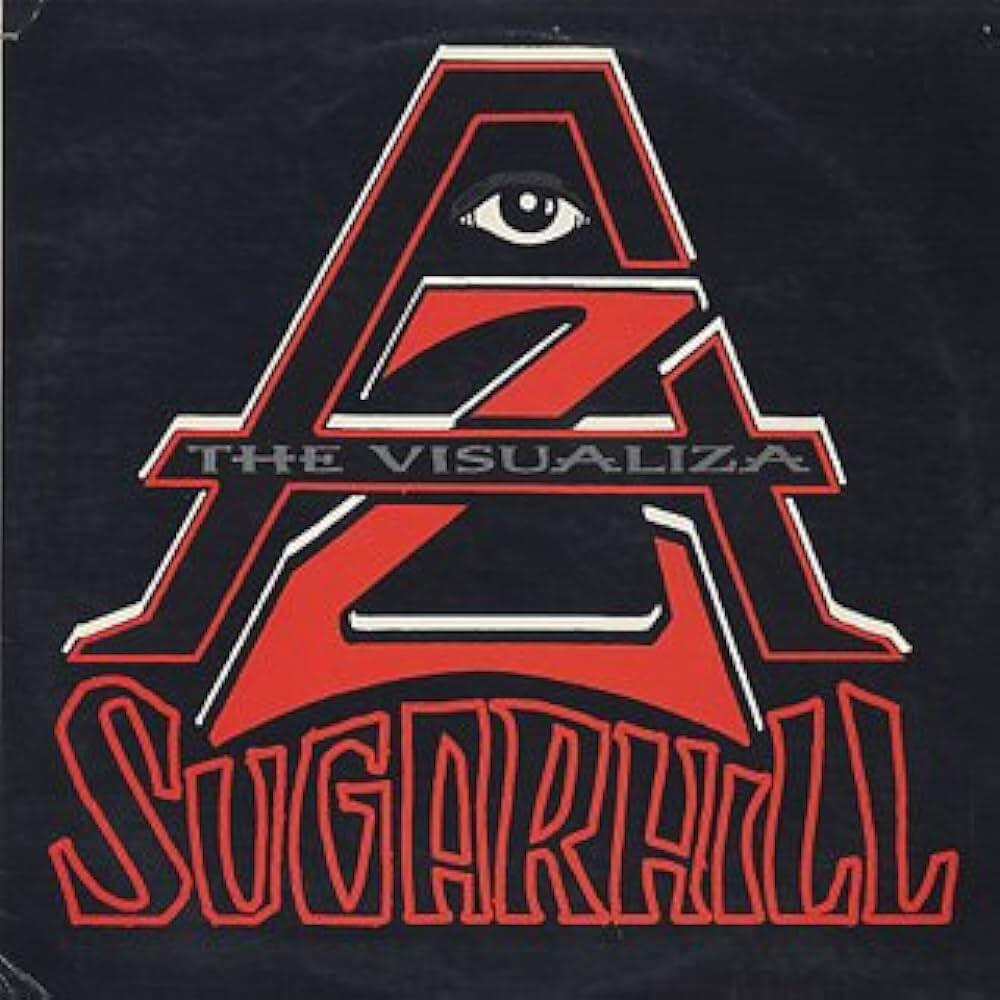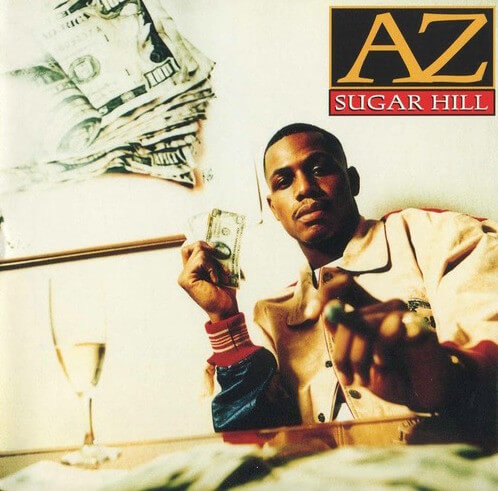AZ’s Breakthrough with “Sugar Hill”


When you dive into the world of Hip-Hop classics, “Sugar Hill” by AZ stands out as a track that’s more than just a catchy song. It’s a rock in Hip-Hop history.
But what many fans of the genre, particularly those tuned into the raw, unfiltered discussions on Drink Champs, might not know is the complex story behind AZ’s creation of “Sugar Hill.” This isn’t just another success story; it’s a tale of conflict, artistic integrity, and the pressures of commercial success in the music industry.
Quick Summary
- AZ’s Artistic Integrity vs. Commercial Appeal: AZ faces a dilemma with “Sugar Hill,” balancing his authentic street-style artistry against the song’s potential for mainstream success. All in all, AZ found himself at odds with the track.
- Chart Success and Industry Pressures: “Sugar Hill” achieves surprising chart success amid the competitive 1995 music scene.
- Certification and Impact on Career: The gold certification broadens AZ’s musical reach, marking a significant moment in his career.
- Cultural Influence of “Sugar Hill“: The song’s lasting impact on Hip-Hop culture bridges underground authenticity with mainstream appeal, solidifying its place in music history.
Table of Contents
AZ’s Early Career and Hip-Hop’s Golden Era
As we dive into the story of “Sugar Hill,” it’s essential to understand where it all began. AZ, a Brooklyn native, emerged as a unique Hip-Hop voice when the genre underwent significant transformation. This era, often called the Golden Age of Hip-Hop, was marked by its innovative beats, complex lyricism, and the rise of artists who would later become legends.
Early Strides in Hip-Hop
Before “Sugar Hill” saw billboard success, AZ was already making waves in the Hip-Hop scene. His early works showcased his distinctive style — a blend of smooth flow and vivid storytelling that quickly set him apart. He wasn’t just another rapper; he was a poet painting pictures with words, a storyteller whose narratives resonated with the streets and beyond.
Collaboration with Nas on “Illmatic“
AZ’s collaboration with Nas on the iconic track “Life’s a Bitch” from “Illmatic” marked a significant moment in his career. This feature elevated his status in the Hip-Hop community. It showcased his ability to hold his own alongside one of the most respected lyricists in the game.
The Cultural Landscape of Hip-Hop
During this period, Hip-Hop was more than music; it was a cultural movement. It was a voice for the voiceless, a form of expression for urban stories that were often overlooked. In this landscape, AZ’s narratives were not just heard; they were felt. His ability to weave tales of urban life with intricate rhymes was a testament to his artistry.
Setting the Stage for “Sugar Hill“
As AZ’s reputation grew, so did the expectations for his music. Backed by EMI and with a generous budget, fans and critics alike were eager to see what he would do next. Little did they know, his next big hit, “Sugar Hill,” would become a topic of debate and discussion, not just for its catchy beat and lyrics but for the story behind its creation.
The Genesis of “Sugar Hill”

Produced by N.Y. legend Leshan “L.E.S.” Lewis, the creation of “Sugar Hill” was a blend of musical innovation and lyrical depth. AZ, known for his introspective and vivid storytelling, was venturing into a territory that merged the raw essence of street Hip-Hop with a sound that had broader commercial appeal. Featuring a flipped sample of Juicy’s “Sugar Free,” This fusion was both a risk and an opportunity – a step into a realm different from his usual steel-cut style.
Pressure from the Industry
The music industry in the ’90s was rapidly evolving, with artists often under pressure to produce hits that were not only artistically sound but also commercially viable.
In 1995, there was fierce competition for chart domination, with Notorious B.I.G., Bone Thugs-n-Harmony, and Coolio setting precedential trends. For AZ, “Sugar Hill” represented this push towards commercialization. He shared with N.O.R.E. and DJ EFN that,
“We (were) street motherf***ers… I’m thinking about rapping…not thinking about the business of it…and how we have to recoup.”
Which showcased a tug-of-war between staying true to his artistic roots and adapting to the demands of a broader market.
The Initial Conflict
Despite the potential of “Sugar Hill” to reach a broader audience, AZ found himself at odds with the track. His discomfort wasn’t with the quality of the song but with how it aligned with his identity as an artist. Reminiscent of a management counseling session on how to approach the record, AZ recalled them mentioning:
“…Spit some real s**t on it…It’s R&B, the ladies can dance…you spit some real s***t and the n****s goin’ like it…you good!…”
Although AZ was known for his authentic representation of street life and the realities of the urban experience. “Sugar Hill,” with its smoother, more mainstream sound, internally, he knew that this record deviated from this image but was necessary from a business standpoint.
Navigating Artistry and Commercial Success with “Sugar Hill”
AZ’s journey with “Sugar Hill” is a classic narrative of the tug-of-war between artistic integrity and commercial appeal. This theme resonates profoundly in the world of music. The single’s performance on the charts is a testament to this struggle and its resolution.
Chart Success and Artist’s Conflict

The concerns of selling out that AZ harbored about “Sugar Hill” were met with an undeniable commercial response. The single debuted on the Billboard Hot 100 on July 15th, 1995, and impressively peaked at number 25 by September 30th, 1995. Its 20-week tenure on the charts reflected the song’s popularity and the successful fusion of AZ’s lyrical depth with mainstream appeal.
R.I.A.A. Certification of “Sugar Hill”
A significant milestone in the “Sugar Hill” journey was its certification by the Recording Industry Association of America (R.I.A.A.). On September 7th, 1995, the single achieved a remarkable feat by being certified gold, having sold over 500,000 copies.
This certification was a numerical testament to the song’s popularity and a symbolic recognition of its impact. It validated the commercial success of a track that had initially stirred mixed feelings in its creator. This achievement underscores the song’s widespread appeal. It marked a proud moment in AZ’s career, reflecting the perfect blend of lyrical artistry and mainstream resonance that “Sugar Hill” came to represent.
Impact on Hip-Hop’s Direction
In the grand narrative of rap, “Sugar Hill” emerged when the genre was increasingly mainstream. The track’s success contributed to this trajectory, showing that Hip-Hop could maintain its roots while appealing to a wider audience. It became a reference point for artists grappling with similar tensions between authenticity and commercial appeal.
Enduring Legacy in Hip-Hop Culture
Today, “Sugar Hill” stands as a classic, not just in AZ’s discography but in the chronicles of Hip-Hop. Like other commercial hits such as Notorious B.I.G.’s “Juicy,” Sugar Hill’s legacy is seen in how it bridges the gap between different facets of the genre, appealing to hardcore Hip-Hop fans and a more mainstream audience. The track remains a beloved piece, celebrated for its smooth beat, introspective lyrics, Miss Jones’ harmonious voice, and the story of growth and acceptance it represents for AZ.
Frequently Asked Questions
What inspired the creation of AZ’s hit song “Sugar Hill”?
“Sugar Hill” was a business decision inspired by AZ’s vision of blending his unique storytelling style with a mainstream sound. The song, which samples Juicy’s “Sugar Free,” reflects themes of success and the aspiration for a better life. It resonates with AZ’s authentic portrayal of life experiences, tailored to appeal to a broader audience beyond his core fanbase.
Who produced AZ’s “Sugar Hill”?
“Sugar Hill” was produced by L.E.S., a renowned music producer in the Hip-Hop industry. L.E.S.’s production style played a significant role in the track’s appeal, combining classic Hip-Hop snappy drums with soulful elements that broadened its reach.
Where was “Sugar Hill” recorded?
The “Sugar Hill” recording sessions took place at Chung King Studios and Electric Lady Studios in New York City. The city’s rich Hip-Hop culture and urban vibe significantly influenced the track’s development and sound.
Reflecting on the Impact of “Sugar Hill” in AZ’s Legacy
As we look back at the journey of “Sugar Hill,” it’s clear that this track was more than just a hit single for AZ. It represented a turning point where artistry, commercial success, and cultural impact converged. The song’s journey from inception to its reign on the Billboard Hot 100 and its certification as gold by the R.I.A.A. is a narrative that encompasses the complexities and triumphs of a music artist’s journey.
“Sugar Hill” is a testament to AZ’s versatility and ability to navigate the changing tides of the music industry. It highlights the balance between staying true to one’s artistic roots while embracing the possibilities of mainstream success. This track not only solidified AZ’s place in the annals of Hip-Hop but also contributed to the genre’s evolution, bridging the gap between underground authenticity and commercial appeal.
Today, “Sugar Hill” remains a beloved classic, a reminder of AZ’s unique place in Hip-Hop history and the enduring power of music that resonates across different audiences. As we revisit this iconic track, we celebrate not just a song but a moment in time that continues to inspire and influence artists and fans alike.

